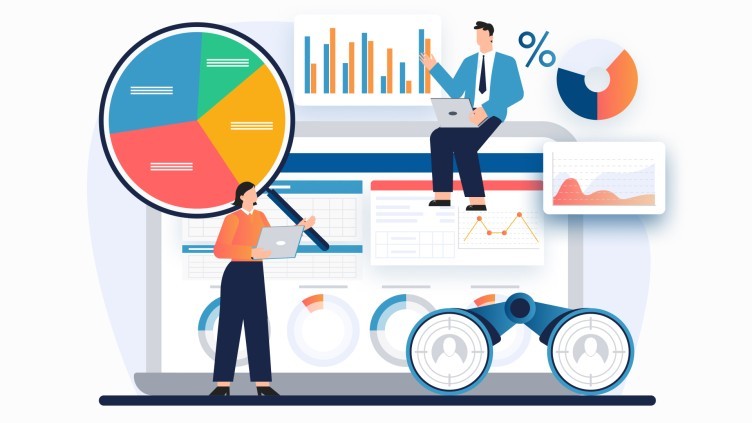Data is considered the new oil, and the real estate sector is not far behind. Earlier, real estate was about location and networking. However, there has been a major shift in how real estate developers can use data to their advantage.
With the advent of data analytics and insights, real estate brokers can use data for decisions regarding property deals. Besides, do you know there is a vast landscape of data analytics reach that you may not be aware of?
A comprehensive understanding of data can help you make strategic decisions related to business deals. Let’s highlight the emerging use of data analytics in real estate.

What is Real Estate Data Analytics?
With real estate data analytics, you can analyze raw data to draw conclusions related to business. In short, it is a process of collecting, organizing, and using data to your business advantage.
But how will you analyze data? You can analyze the data using different techniques and tools that help monitor and report advantage predictive models to deliver action-based insights.
In real estate, data analytics involves processing large property-related data, including market trends, location-based stats, and consumer preferences. The data insights can forecast different market fluctuations and determine property valuations.
The Market Size
You can expect big data to be a game changer in the growing real estate market. According to a report, the real estate sector is expected to reach one trillion dollars by 2030.
In addition, the data can help real estate companies analyze vast amounts of data, which they can leverage to their advantage. However, this growth can be attributed to increased demand for predictive analytics. As a real estate broker, you must seek the data to stay one step ahead of your competitors. Likewise, real estate analytics can help facilitate risk mitigation. Developers can use the data to identify high-potential investment areas.
Why Must You Use It to Your Advantage?
Real estate data analytics offers many additional benefits you must know about.
Data insights ensure that all business decisions are based on evidence rather than intuition. Plus, evidence-based decisions can give you better outcomes for marketing plans.
By analyzing market trends, real estate professionals can mitigate risks associated with market fluctuations. Real estate is volatile, and data insights can help real estate brokers prepare for the risks.
The best part is that real estate brokers can identify consumer demographics, leading to the best marketing efforts. Data analytics can reduce costs, which can benefit businesses. Collecting manual data can be costly, but data tools are cost-effective.

Driving Factors To Decide How You Can Use Data-driven Insights:
When it comes to data-driven decisions, you can consider some crucial factors. These factors can be helpful in transformation.
Optimizing Strategies
By leveraging data-driven insights, you can successfully optimize your real estate strategies. Well, this approach involves property-related trends and analyzing the competitive landscape.
As a real estate broker, you can adopt strategic property management on data-driven insights that ensure your real estate portfolio is stable. By doing so, you can see a visible difference in your peak performance.
Optimizing strategies to your advantage will also give you an edge over market risks. Data-driven decisions can help optimize the strategy. Also, they help scale business. Consider using the best tools for this.
Forecasting Investment Decisions
Are you thinking about real estate profitability? Data analytics tools can be valuable to forecast real estate profitability. Real estate investors can anticipate current market trends by analyzing the data. Following this, real estate companies can make better investment decisions related to property investments.
Additionally, data on different traffic patterns can help to monitor areas with potential returns. Property investment is risky, but data analytics tools can reduce the risk of investing in property.
Applying statistical techniques can introduce data most effectively. Plus, it prevents insights into understanding consumer preferences related to investment.
Efficient Marketing
Marketing has become the most significant business need. In real estate, marketing can help in lead generation & networking. Digital marketing is vital to foster business growth.
By leveraging data analytics, real estate companies can use demographic data to marketing advantage. Different data-driven tools can perform complex analytics to understand consumer patterns and preferences.
Once you understand the data, you can use the data for effective marketing. With the power of artificial intelligence and big data, you can reach the right target in business. Use the data to get actionable insights and transform it to your business advantage.
Overcoming Challenges
Real estate brokers can leverage the power of data analytics for business. But like any other tech adoption, this has its share of challenges. Data-driven tools can help to accumulate data, which you can use to your business advantage. But, with the high volume of data, management can be complex at times.
Additionally, compliance with privacy laws and data quality can pose problems in data analytics adoption. Navigating these challenges will require commitment and effort from your end.
It is essential to partner with tech experts for seamless business integration. Besides the challenges of being part of every business, overcoming these challenges is vital. If you want to achieve the best results, you must overcome these challenges.
The Future is Here With Big Data
You must leverage the transformational power of data analytics in your real estate business. Plus, it is no longer an emerging trend, as it has become a force for business profitability. You can make informed business decisions and predict outcomes by leveraging this data.
Plus, you can approach market trends and respond to them – with an agile approach. Embrace this evolution by pushing your traditional real estate boundaries – with a new tech approach. It’s time you make a shift in how you make decisions. Data analytics is the future of the real estate business.
